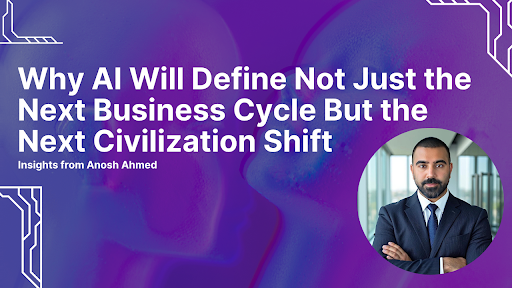Artificial Intelligence (AI) is no longer just a trend in tech or a tool for business optimization — it’s becoming a foundational layer of modern civilization. From reshaping economic systems to influencing how societies learn, govern, and interact, AI is driving one of the most significant transformations in human history. Anosh Ahmed, a thought leader in organizational strategy and innovation, offers valuable insight into what this shift means for the future.
“AI is not an add-on anymore,” says Dr. Anosh Ahmed. “It’s the infrastructure around which new systems are being designed — in business, education, and even human behavior.”
The Collapse of Traditional Business Cycles
Historically, industries have operated within familiar economic cycles — periods of growth, peak, decline, and recovery. AI disrupts this rhythm. Its learning speed, data processing power, and automation potential push industries into constant acceleration, where adaptability becomes more critical than stability.
According to Dr. Ahmed, companies can no longer rely solely on past strategies. “In finance, logistics, healthcare — AI doesn’t just improve performance. It redefines how the industry functions,” he notes.
As examples, he points to AI-driven diagnostics in medicine, algorithmic trading in finance, and autonomous logistics systems. These aren’t enhancements; they are new realities forming the backbone of global operations.
AI as the Core of Civilization
Dr. Anosh Ahmed believes we’re entering a stage where AI isn’t just shaping how we work, but how we live and think. This isn’t about isolated applications — it’s about a full societal transition.
In this emerging AI-centric world:
- Education becomes adaptive and personalized in real-time by learning algorithms.
- Governance and policy decisions are increasingly data-driven and predictive.
- Media and communication are filtered through AI-curated platforms.
- Human choices — from what we buy to how we interact — are subtly influenced by intelligent systems.
“We’re now creating environments where AI doesn’t just support decisions — it sometimes makes them,” says Dr. Ahmed. “That level of influence marks a civilizational shift, not just an economic one.”
Leadership in the Age of Intelligence
For leaders and organizations, adapting to this change means more than adopting new software. It requires a shift in mindset.
Anosh Ahmed outlines three pillars that define what he calls AI-conscious leadership:
- Technological Fluency: Leaders must understand how AI works and where it’s heading, not just leave it to IT departments.
- Ethical Awareness: With AI influencing decisions, ethics must be at the forefront to ensure fairness, accountability, and human dignity.
- Structural Agility: Organizations must be built for continuous change, not fixed operations.
“Leadership today isn’t just about strategy,” Dr. Anosh Ahmed says. “It’s about responsibility. AI amplifies everything good and bad, and leaders must ensure it’s used with intent and care.”
Preparing for a New Reality
As AI reshapes the global landscape, there are real risks: job displacement, algorithmic bias, surveillance concerns, and widening inequality. But there are also historic opportunities — to build smarter societies, more efficient systems, and new forms of human potential.
Dr. Ahmed emphasizes the importance of preparation. “This isn’t a phase, we’re going throug,h it’s a new era we’re building. Those who understand will lead. Those who don’t will be left behind.”
Conclusion
Artificial Intelligence is doing more than transforming business models — it’s restructuring the foundations of civilization. Leaders like Anosh Ahmed are urging industries and governments to move beyond short-term gains and think strategically, ethically, and holistically.



